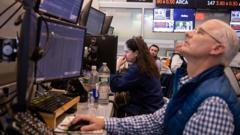US stocks experienced an extraordinary rally on Wednesday following President Donald Trump's unexpected announcement to suspend some tariffs, signaling a potential easing of trade tensions. Instead of enforcing steep tariffs as previously planned, the White House has opted for a reduced import tax rate of 10% on goods from most countries. This decision comes after several days of stock market instability tied to looming tariff implementations.
The S&P 500 index soared 9.5%, marking the biggest one-day increase since 2008, reversing some of the losses incurred after the initial tariff announcements. Trump's shift occurs just a day after new tariffs impacted countries like Vietnam, which faced up to a 46% levy on imports. Analysts had initially warned that Trump's announced tariffs could trigger a recession, leading to a significant sell-off in stocks and government debt.
Market experts noted that the recent volatility prompted Trump to reconsider his stance when it became clear that the bond market was also in turmoil. Capital Economics chief North America economist Paul Ashworth stated, "Once the bond market began to weaken too, it was only a matter of time before he folded." He anticipates that negotiations with China will eventually materialize, despite the complexity of the current situation.
The stock market comeback saw the Dow rise by more than 7.8% and the Nasdaq increase by over 12%. Companies dependent on imports, like Nike and Apple, saw their stocks jump significantly following the announcement. However, the gains were not enough to fully recover from previous losses, and the S&P 500 remained approximately 3% lower than before Trump's announcement.
Despite the temporary tariff reprieve, challenges remain, especially concerning imports from China, which accounts for a vast portion of US footwear and clothing supplies. The National Retail Federation had previously forecasted a 20% decline in shipments handled by US ports due to the rising tariffs.
In subsequent public addresses, Trump expressed optimism about reaching a trade agreement with China and hinted at possibly allowing exemptions for individual companies. This strategic pivot came amid mounting political pressure and from influential supporters like Tesla CEO Elon Musk and billionaire Bill Ackman, who called for a pause in tariffs.
Trump's decision to scale back trade duties caught many by surprise, including financial institutions. Shortly after the announcement, Goldman Sachs revised its earlier recession forecast, acknowledging the uncertain economic climate resulting from tariff tactics, even while predicting minimal growth for the year.
Overall, Trump's tariff suspension marks a significant moment in ongoing trade relations and reflects the complexities of balancing economic strategies with market stability.



















